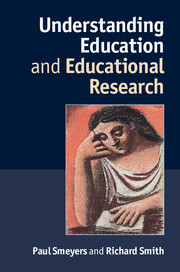Book contents
- Frontmatter
- Contents
- Acknowledgements
- Introduction
- 1 Education and its research
- 2 The nature of social science
- 3 The idea of method
- 4 The nature of philosophy
- 5 The art of research
- 6 Language, truth and meaning
- 7 On the dominant nature of educational research and its shortcomings
- 8 Research, policy and practical reasoning
- 9 The limits of measurement
- 10 Parenting and government intervention in the family (case study I)
- 11 Researching happiness and well-being (case study II)
- 12 Philosophy and research
- Notes
- References
- Index
10 - Parenting and government intervention in the family (case study I)
Published online by Cambridge University Press: 05 November 2014
- Frontmatter
- Contents
- Acknowledgements
- Introduction
- 1 Education and its research
- 2 The nature of social science
- 3 The idea of method
- 4 The nature of philosophy
- 5 The art of research
- 6 Language, truth and meaning
- 7 On the dominant nature of educational research and its shortcomings
- 8 Research, policy and practical reasoning
- 9 The limits of measurement
- 10 Parenting and government intervention in the family (case study I)
- 11 Researching happiness and well-being (case study II)
- 12 Philosophy and research
- Notes
- References
- Index
Summary
The radical pluralism that has swept the world, the encouragement of family members to behave more as individuals, and the general tendency towards greater child-centeredness have changed child-rearing. At the same time the role of parents and schools in the education of children has been redefined. From being partners of schools in improving children’s learning, parents more and more judge for themselves the quality of education. Research into ‘school effectiveness’ has emerged and so have a number of government initiatives designed to ‘improve’ schools. At the same time the so-called ‘responsibilisation’ of parents and children has led to school goals and behavioural norms entering the home. This is not isolated from the ideology of the market, which has entered, here as elsewhere, the social and personal realm. Children are regarded as an investment in the future. Because many parents feel insecure and inadequate they have turned to experts. Moreover, governments all over the world now advise and admonish parents on a range of matters from their children’s diet to how many hours they should be allowed to spend on the computer. The tendency to hold parents accountable for child-rearing and (thus reducing the need for costly governmental intervention) can for example be identified in a paper by Jack Westman (1996), who argues that a parent licence would validate parental rights, establish parental responsibility and provide a basis for societal support (financial benefits, parent education and training, and protective services for children when necessary).
The declining authority of custom, tradition and religion has had a number of other significant effects on the way we view children and the relationship in which they stand to parents. In particular such developments have led many to regard rights rather than some settled conception of the good as the primary guiding concept in a liberal society. The question ‘what should be done?’ and ‘how should children be taught to live?’ have been replaced by ‘whose interests are to be considered?’ and ultimately ‘who is entitled to decide?’. It may seem to suggest a view of education and upbringing that positively reinforces the development of that autonomy and enables children to eventually choose their own conception of the worthwhile life.
- Type
- Chapter
- Information
- Understanding Education and Educational Research , pp. 155 - 171Publisher: Cambridge University PressPrint publication year: 2014



